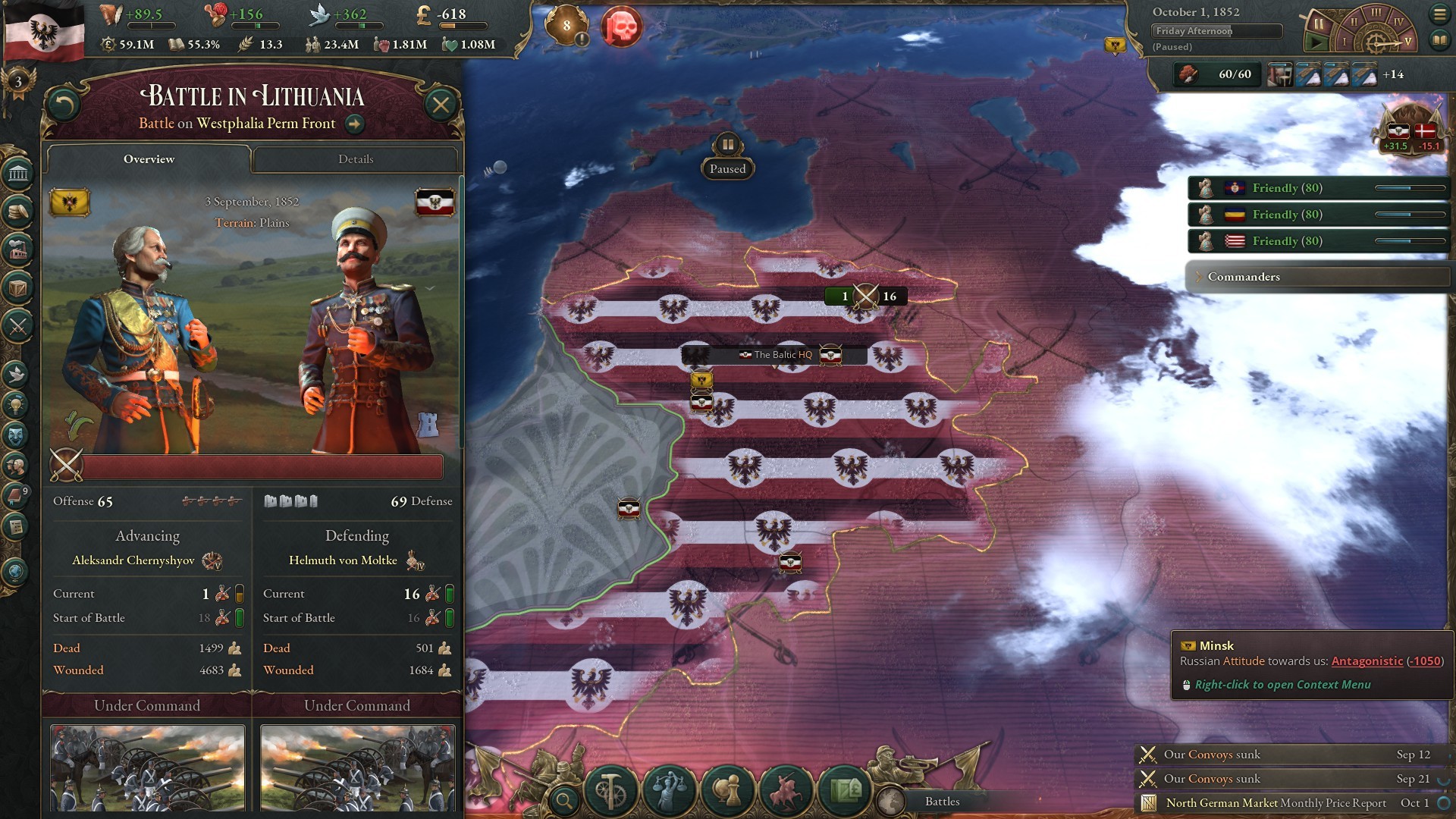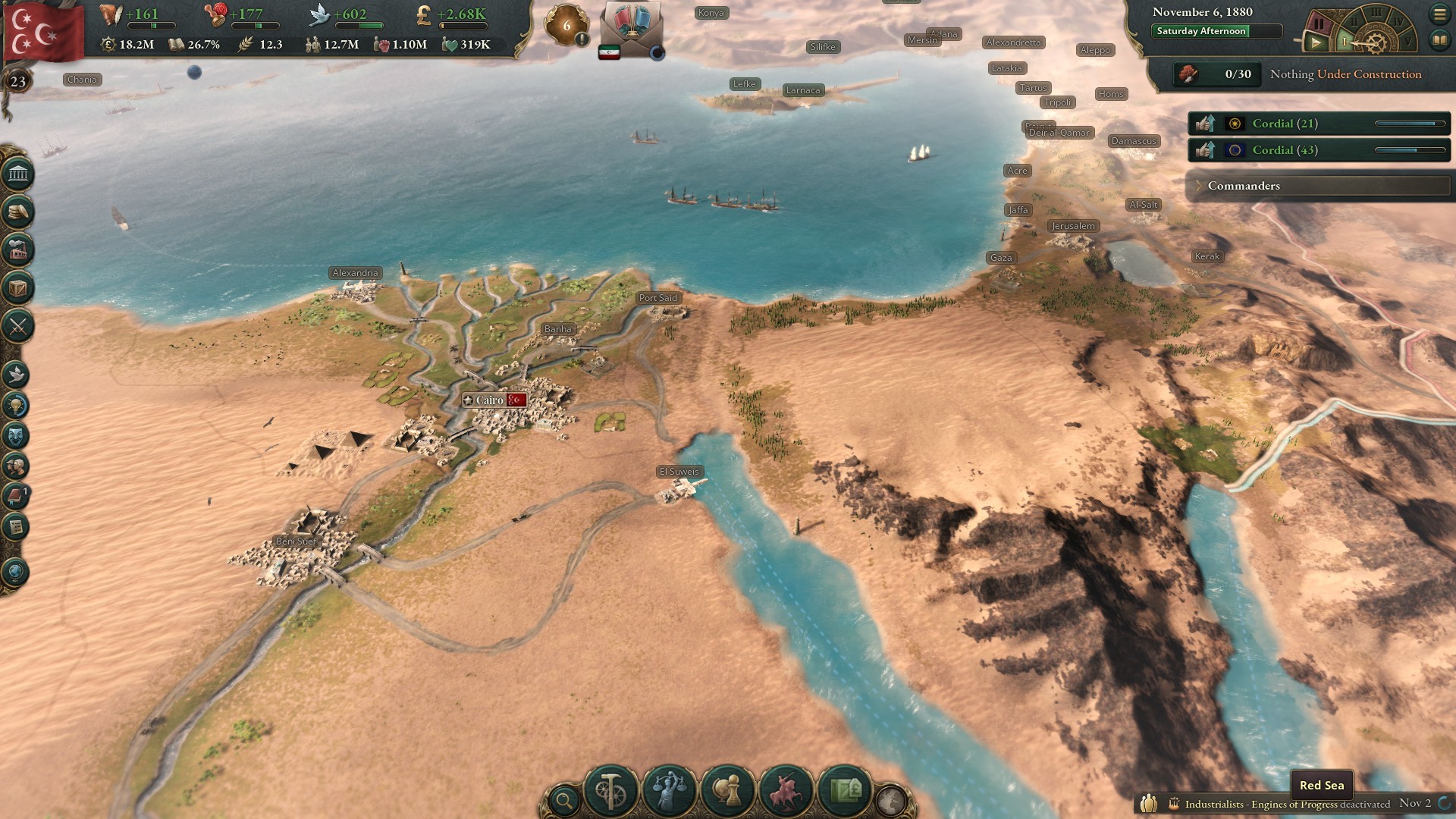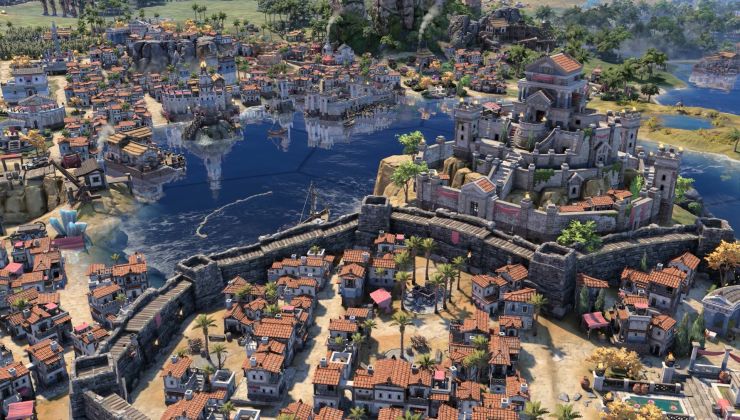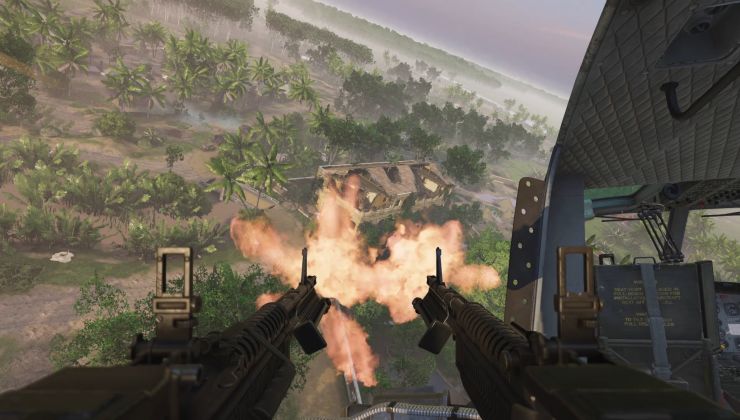Paradox Development Studios’ latest game depicts a century of history with a focus on economics and society. Facing the challenges of a changing world can be daunting but the game is good at letting you play at your own pace.
Note: Key provided by Paradox
When I first booted up Victoria 3, I was greeted by optimistic, celebratory images that seemed to portray a world where anything could be possible. The preselected nations, categorized neatly in various sorts of tutorials or guided experiences, describe problems and background of each but all invariably have a tinge of hope in a better future. Even after several dozen hours playing the game, dealing with messy wars, social unrest, industrialization and colonialism, I find that initial impression has stuck around.
The map is probably the prettiest yet in a Paradox title with the art direction really hitting all the right notes. Things like major rivers, lakes, islands, mountains and other major features more or less accurately-represented around the world as delicate clouds float by, wisps of smoke rise from volcanoes, and the occasional signs of wildlife. Signs of civilization are also depicted with cities growing, railways extending and trains running about, and mines and industry popping up as you build them up. It’s a pleasure to look at even when zoomed out, as the map takes a more paper-like look and trade routes and country names appear.
All of this gives an impression that there’s many parts to the whole. And, make no mistake, this is a complex game. It, in fact, revels in its complexity; adjusting tariffs on exported goods, bolstering support for groups such as industrialists in order to pass legislation, and making sure your citizens have not only basic goods but can purchase luxury goods are all the meat of the gameplay. With that in mind, the game seems content to let the player figure things out at their own pace: the world continues to run more or less in sensible ways even without the player there to steer things along. Through the various in-game tutorials and guidance, the tool tip system, and good old fashioned trial and error I was able to come to grips with how things work.
The heart of the game is how it portrays its society. The population is broken down into Pops which are units that represent the class, education, ethnicity and the like. These are not necessarily politically active but those that are will support various interest groups such as landowners, the clergy, or trade unions. Depending on their clout and whether or not they are part of the government, it may affect which laws can be passed.
Good management makes most political realities feasible and stable. When the population’s various needs aren’t being met, it opens the door to radicalization. Enough of that and there may be demands for reforms like, say, implementing limited voting rights. And, well, those with clout and in-power who benefit from the way things are will be against that sort of thing. So pushing through any sort of change can quickly become hazardous—political instability may lead to rebellions and secessionist movements. Figuring out how to keep your country from devolving into chaos while continuing to expand the economy or your nation’s borders is a tough balancing act.
The tension in between potential economical and social reform makes for interesting gameplay and it’s not just the obvious big things like ending serfdom or universal suffrage that can cause a stir. More than once I found myself with long periods of tension and civil war when I pushed too hard or too fast in any given direction and had to back down and accommodate my interest groups in order to not fracture my country.
There is a varied bag of tools and ways to shape things in the direction that you may want over longer periods of time. Laws allowing for secret police to keep radicals down will help the more polarized things are but more subtle tools like suppressing or bolstering interest groups are also available. Incidentally, those tools are lost the more open your society becomes. Something like protected speech means that the government can no longer use some of its more heavy-handed approaches. The events that pop up from time to time with issues of the day (like a mine collapse) become a handy way of placating (or radicalizing!) parts of the population.
Managing the economy is something else that’s a continuous balancing act. On the one hand, growing the resource and industrial base as large as you can in order to be able to afford a large army or provide for a large population is an obvious goal. On the other, focusing too much on any one area can make things harder in the long run: being the top producer of steel is great and all but without investing in administrative buildings it’s difficult to run the country and without universities it’s difficult to find qualified workers for more modern production techniques, let alone keep up with technological research. As you might expect, those things aren’t exactly directly profitable. And go too far with certain industry and your population may not be able to afford staple goods anymore and … what’s that? In the meantime the nation has fallen into debt and has to pass higher taxes to fix its budget issues which can quickly radicalize the population which, in turn, introduces more problems into the equation.
Supply and demand drive growth as might be expected but things like the economic laws set in place may allow for subsidizing industry and for collecting tariffs on import or export routes. Basic, extractive, industries remain relevant all throughout the game although they may be modernized like all other industries. Part of the challenge is figuring out what to manage and when as there are often trade-offs to consider; using new techniques may create greater output but may require additional resources like coal or oil and optimizing by automating and reducing the workforce is great—so long as those unemployed laborers can find other jobs and not radicalize. I’ve experimented a lot in various short games I tried and have come to understand a fair deal over the many hours I put in. Although I’m certain there’s a lot more that I have yet to learn. I couldn’t even begin to venture on whether or not there’s an “optimal” way of playing as the circumstances of each nation affect how the economy develops.
That each nation has its own resource limitations is one of the main drivers of conflict and colonization in the game. This conflict isn’t usually war, however. Instead of declaring war outright, nations engage in what are termed “diplomatic plays”, a stated objective against a nation such as taking a state, forcing it to open up its markets, becoming a protectorate etc. It proceeds by phases and nations which have an interest in the region may take sides (or be swayed to take one by promises of something). Things only escalate to a war if neither side backs down and things like mobilizing troops can serve as a bluff to get others to concede. Once mobilized, however, nations can’t demobilize until their conflict is over and, worse still, may convince others that they need to intervene militarily, which may unexpectedly turn a trifle into a real costly mess.
It’s a clever system but not without its flaws. I found that the AI is a little too easy to sway if a little groundwork is done between plays, such as raising relationships. In essence, if a big-hitter country is trying to intervene somewhere, it is too easy to get another great power to intervene on your side and, if war breaks out, bear the brunt of the fighting. While 19th century was the century of the balance of power doctrine as best exemplified by disastrous interventions like the Crimean War, it is still odd to see a nation like France intervene against the UK in the Opium Wars instead of joining in to take a slice of the Chinese market for itself.
Ideology also seems to not really factor in; reactionary countries will intervene in favor of revolutionary ones and vice-versa in a manner that doesn’t quite feel like Bismarkian Realpolitik. Given that in the game’s time period covers the height of imperialism, the rise of (and reaction to) socialist politics and, later, fascism, it can feel a little jarring. As an example: mismanagement and internal conflicts drove me to adopt socialist policies and become a council (i.e. soviet) republic. There was an attempt at an undemocratic counter-revolution that escalated to a civil war. Austria, which had managed to remain an absolutist monarchy, took my side against its ideological bedfellows because I offered them a relatively unimportant concession. I avoided a prolonged civil war and Austria got an "obligation" from me which it used to call me into an minor conflict later on. I clearly won that exchange.
Likewise, I like the war system and its abstraction, overall, but find that there are strange aspects to it that likely need more tweaks. It’s a more hands-off system with mobilized troops being under the command of generals who attack and defend along fronts as best as they can. I am fine with the loss of tactical control because things like technology and personality traits go a long way in determining outcome. What I take issue with is how there’s very little intermediacy in the scale of conflicts. In other words, local conflicts don’t really exist and colonial powers will send their largest armies almost every time, often into places far from their origin like Africa or Asia to fight.
I’ve also failed to see any sort of World War 1-type conflicts that involve the whole world and millions of casualties happen, even when multiple great powers participate. Casualties are not nearly high enough and the stakes that are fought over aren’t large enough—there is a lack of postwar negations for particularly large conflicts. It may run counter to the diplomatic play system but the time period depicted by the game also had one of the most consequential conferences in history: the Paris Peace Conference that lead to the Treaty of Versailles. The changes to the world order went beyond the prewar stated aims. So even when larger conflicts erupt, their results feel anticlimactic.
There’s also not enough that makes each country have its own unique feel beyond economics and laws. Yes, that does make each session play out differently but in terms of general objectives it’s much more directionless. The little potential direction that is there left me wanting more. For example, there are conditions for unifying Germany as one of the powers in the region. Another for restoring the emperor to power in Japan. Yet another for the potential fracturing of China. But these feel tacked on rather than part of the core identity of each—what drove them to act in a certain way in history beyond simple economics or vague notions of prestige or power. It’s a sandbox game, I understand, but there’s little of the atmosphere that lead to specific approaches.
Another strange omission, I think, is that colonialism is just treated in a rather matter-of-fact way. Setting up colonies is a matter of having the law in your country, declaring an interest in a region and hitting a button. Rarely this may lead to a war with the nation whose territory you are stealing. It is an uninteresting execution. Given that issues that concern interest groups and the characters that lead them may see events and choices, it feels odd that there isn’t anything like it for colonial management. In fact, the only event that I saw along those lines was when another colonial power attempted to rile up the natives against me. It’s not only strange that the natives have no real representation in terms of events but also that your own Pops don’t have their own events regarding their stances on the colonies especially given that all sorts of other political movements and stances are of concern to them.
The computer opponents are fairly competent despite my complaints about some of their oddities. They expand and secure their interests with relish and compete with the player on many fronts and are eager to pursue hegemony not only economically but diplomatically by signing treaties and pacts of all sorts. Still, overall, I’d have to say that ultimately Victoria 3 is a game that you are playing against yourself. What matters the most is your own population and economy and all that’s going on beyond your own borders is of secondary concern. It’s a game that lets you play at your own pace, with your own level of understanding and get something out of it.
With all the caveats and complaints I may have about some of the design implementations, I think that the fundamentals of the games are solid. Despite some of my complaints that boil down to “I wish there was more content,” its a game that has content galore as-is. Though I crossed the 20-hour mark without really realizing it, the 40-hour mark with pleasure. Even late last night I found myself playing more while trying to wrangle all of my thoughts into coherent form for this review. While I’m not sure I’ve managed to explain clearly, I think I’ll say that it’s easy to forgive the imperfections I’ve encountered on account of its polished and appealing core gameplay.
The bottom line is that there’s nothing else quite like Victoria 3 out there. It may not be the perfect society simulator but it’s certainly a very ambitious one and I’m grateful that it doesn’t try to run away from that fact. It is a game as optimistic in its presentation as it is the belief that its players will enjoy themselves the more they immerse themselves in it.
You can grab Victoria 3 on Paradox’s Webshop, the Humble Store, or Steam.
Sounds like it will be pretty amazing around 5 or 6 DLCs in.Paradox games are usually games that I can't wait to jump in - about a year or a half after release...
Last edited by Lycurgus87 on 25 Oct 2022 at 11:58 am UTC
No mention whether the Linux version works well or has any issues... I guess that's a good sign! :-DNo issues that I could find
Out of any that still release Linux native, Paradox are the ones which I have had absolutely zero issues with.No mention whether the Linux version works well or has any issues... I guess that's a good sign! :-DNo issues that I could find
Now, if only someone would tell them how depth of field actually works when it is not computer generated...One of those nonsense-effects like Bloom that only have one useful state: Toggling them off.
You just want to wait till fresh Paradox project grows up enough to be GiveOrTake polished and playable.
Kudos

















 How to set, change and reset your SteamOS / Steam Deck desktop sudo password
How to set, change and reset your SteamOS / Steam Deck desktop sudo password How to set up Decky Loader on Steam Deck / SteamOS for easy plugins
How to set up Decky Loader on Steam Deck / SteamOS for easy plugins
Oh and the name doesn't mean anything but coincidentally could be pronounced as "Buttery" which suits me just fine.
See more from me